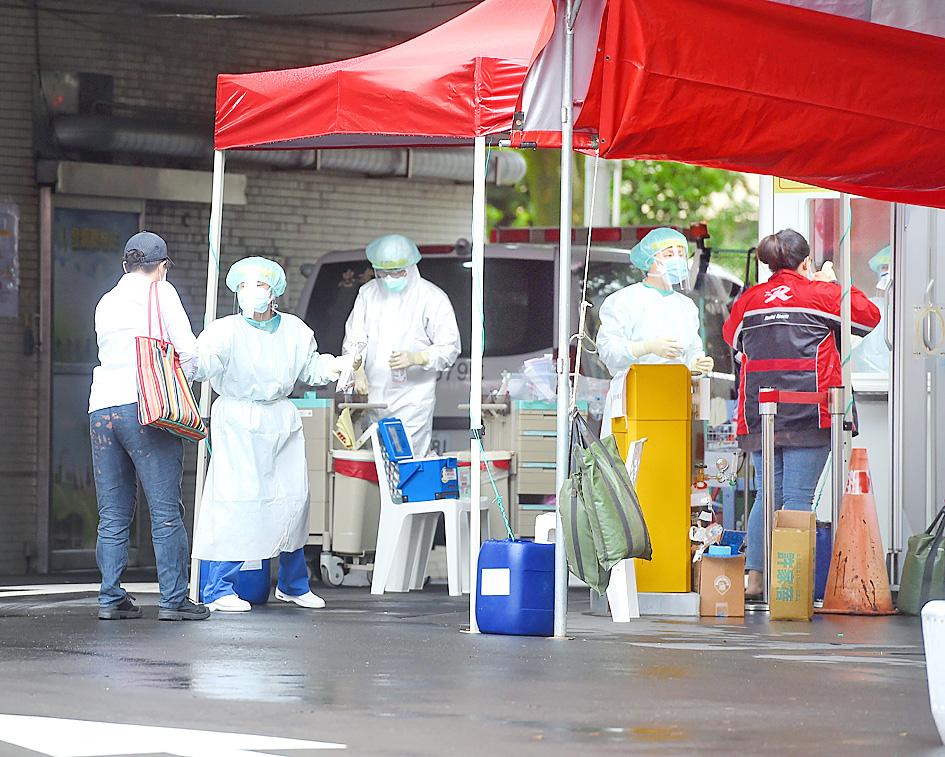Quarantining at home after testing positive for COVID-19 in a rapid screening test would be the “new normal,” Taipei Deputy Mayor Vivian Huang (黃珊珊) said yesterday after the city adjusted its quarantine measures to free up medical facilities for COVID-19 patients with serious symptoms.
The Taipei Department of Health announced a new set of triage procedures for people who have tested positive for COVID-19 at a rapid screening station.
Effective immediately, anyone who is moderately to seriously ill, regardless of age, would be sent to a hospital in an ambulance, the department said.

Photo: Fang Pin-chao, Taipei Times
People with minor symptoms, those who are older than 55, or younger than 55 with chronic diseases or difficulty quarantining at home would be sent to quarantine centers in designated buses or taxis, it said.
Asymptomatic people under 55 would be required to quarantine at home for 17 days and check in daily with their local health center, the department added.
The more than 1,000 people in quarantine hotels would be instructed to return home after 10 days to undergo another seven days of quarantine as long as they are asymptomatic or have not had a fever for more than one day, Huang said.
Quarantine hotels must accept patients with minor symptoms transferred to them by hospitals, as hospitals must focus on treating more serious cases, she added.
Starting yesterday, orders to quarantine at home apply to contacts of confirmed cases, asymptomatic people who have tested positive in a rapid screening and those who are asymptomatic after spending 10 days in a quarantine hotel, Huang said.
“People need to prepare themselves, as living near confirmed cases will be the new normal,” Huang added.
The city must first come to a halt so that sources of infection can be ascertained and chains of infection severed, Huang said.
The cases being announced now were infected more than two weeks ago, she said, adding that further observation is needed over the next two weeks to ascertain whether infections are trending downward.

Taiwanese can file complaints with the Tourism Administration to report travel agencies if their activities caused termination of a person’s citizenship, Mainland Affairs Council Minister Chiu Chui-cheng (邱垂正) said yesterday, after a podcaster highlighted a case in which a person’s citizenship was canceled for receiving a single-use Chinese passport to enter Russia. The council is aware of incidents in which people who signed up through Chinese travel agencies for tours of Russia were told they could obtain Russian visas and fast-track border clearance, Chiu told reporters on the sidelines of an event in Taipei. However, the travel agencies actually applied

Japanese footwear brand Onitsuka Tiger today issued a public apology and said it has suspended an employee amid allegations that the staff member discriminated against a Vietnamese customer at its Taipei 101 store. Posting on the social media platform Threads yesterday, a user said that an employee at the store said that “those shoes are very expensive” when her friend, who is a migrant worker from Vietnam, asked for assistance. The employee then ignored her until she asked again, to which she replied: "We don't have a size 37." The post had amassed nearly 26,000 likes and 916 comments as of this

New measures aimed at making Taiwan more attractive to foreign professionals came into effect this month, the National Development Council said yesterday. Among the changes, international students at Taiwanese universities would be able to work in Taiwan without a work permit in the two years after they graduate, explainer materials provided by the council said. In addition, foreign nationals who graduated from one of the world’s top 200 universities within the past five years can also apply for a two-year open work permit. Previously, those graduates would have needed to apply for a work permit using point-based criteria or have a Taiwanese company

The Shilin District Prosecutors’ Office yesterday indicted two Taiwanese and issued a wanted notice for Pete Liu (劉作虎), founder of Shenzhen-based smartphone manufacturer OnePlus Technology Co (萬普拉斯科技), for allegedly contravening the Act Governing Relations Between the People of the Taiwan Area and the Mainland Area (臺灣地區與大陸地區人民關係條例) by poaching 70 engineers in Taiwan. Liu allegedly traveled to Taiwan at the end of 2014 and met with a Taiwanese man surnamed Lin (林) to discuss establishing a mobile software research and development (R&D) team in Taiwan, prosecutors said. Without approval from the government, Lin, following Liu’s instructions, recruited more than 70 software